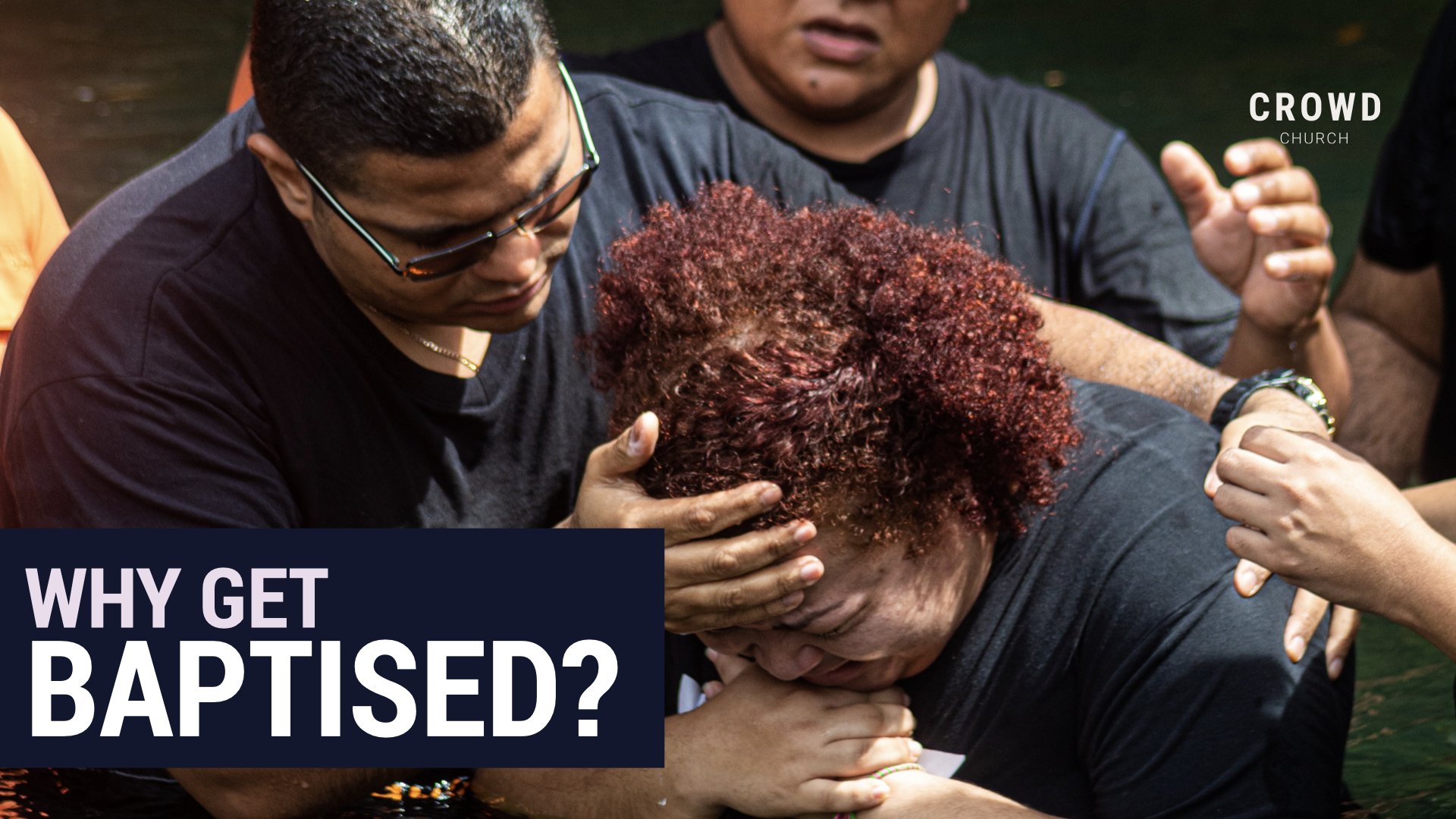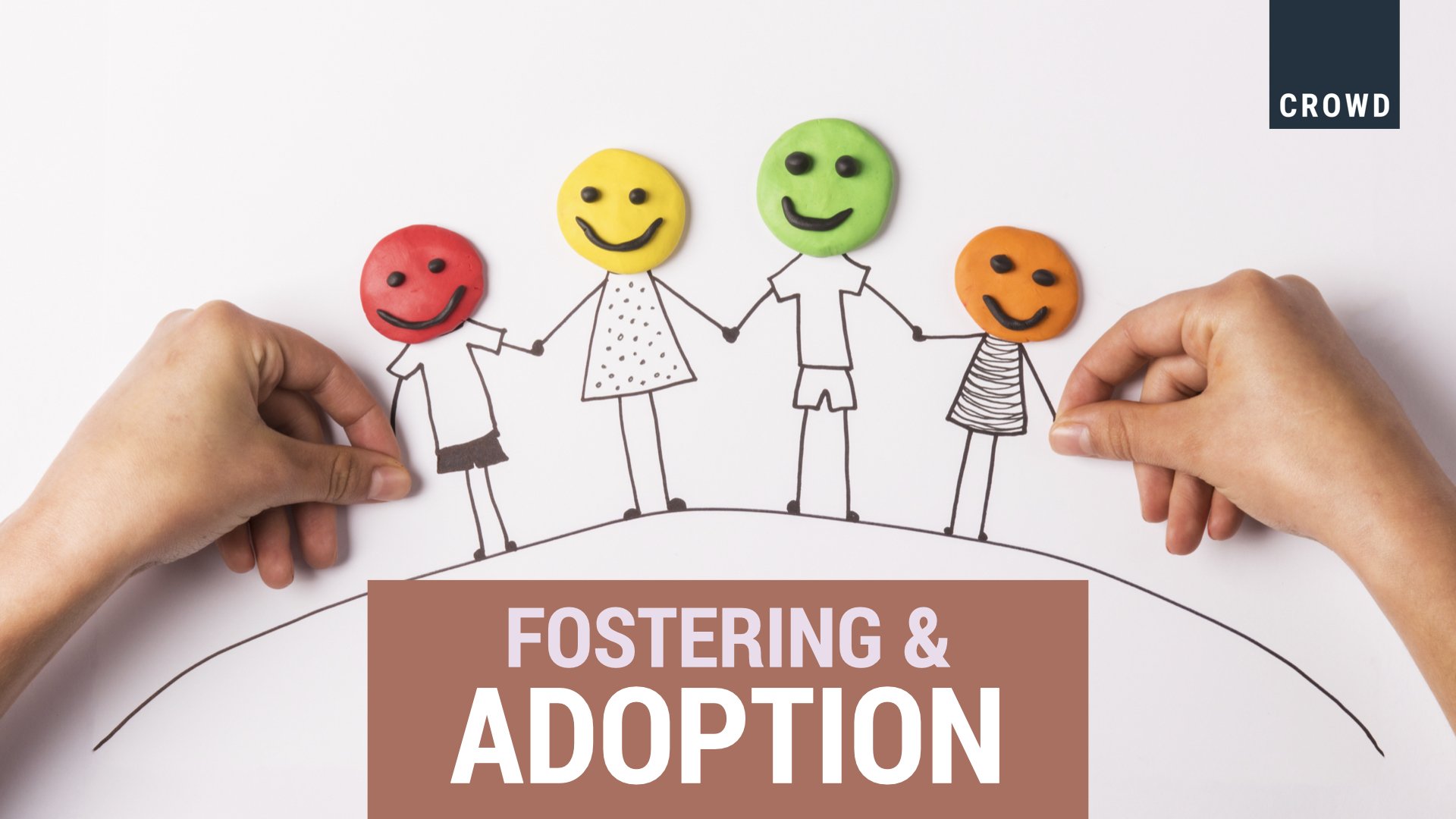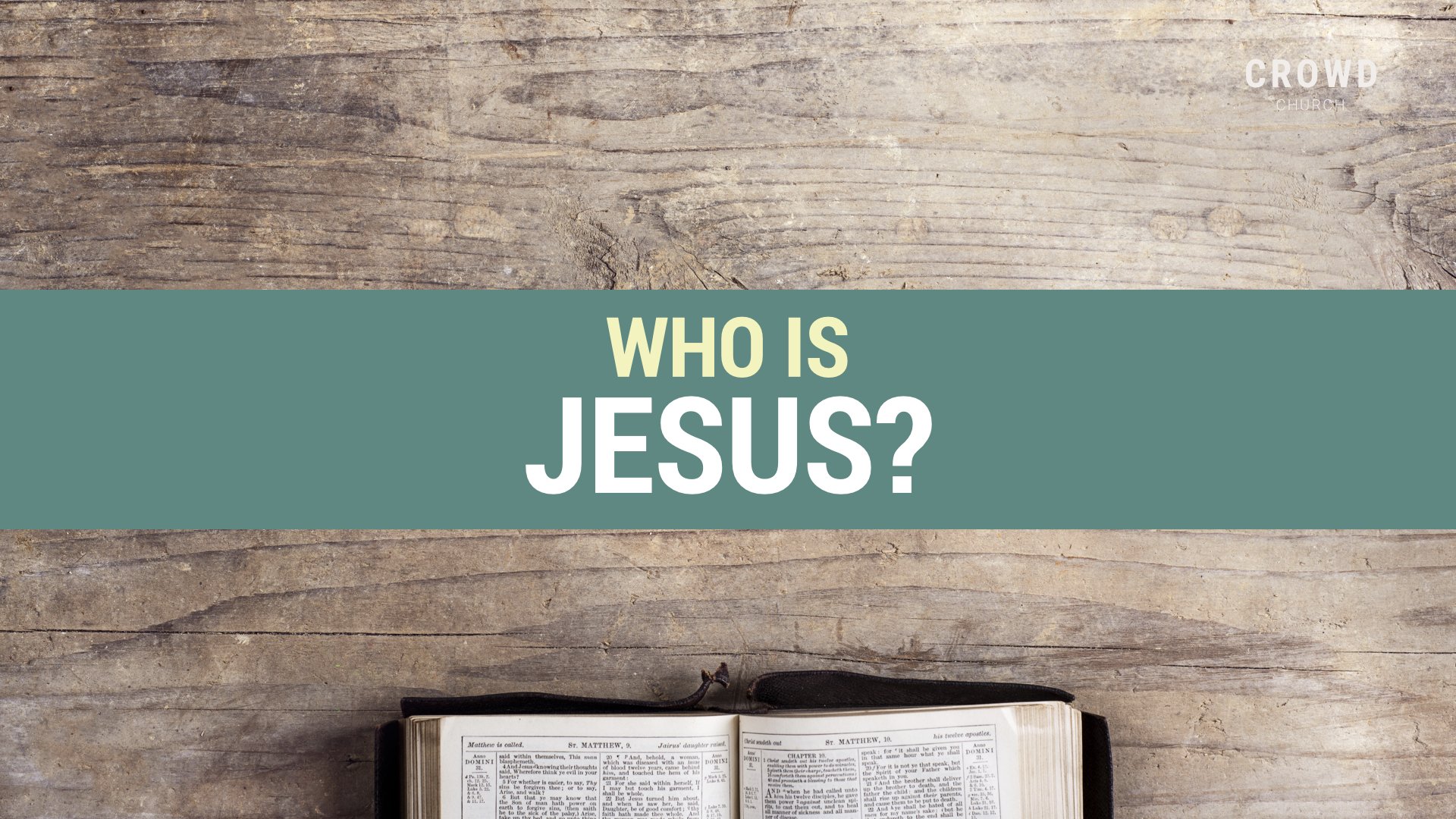What Does The Bible Say About Money & Work?
Podcast:
What does the Bible say about Money & Work?
— James & Hannah Sloan
James Sloan: So money and work. Two fairly small topics that we've been asked to talk about today. We thought we'd do it together as a couple partly because it's great to have two voices, sharing on it, but also because it's something we've had to work out together. It's not a decision that I make or a decision that Hannah makes. We wrestle with them and work out how as a couple, and as a family, we want to steward our money and how we want to manage our work.
First of all, we are talking about this in light of the fact that we have made a decision to follow Jesus. Therefore, everything that we do falls in line with that being our highest priority. And so we're talking about this as believers, as Christians and as people who want to steward what we've got well. Regardless of whether you follow Jesus or not, there are some great principles in Scripture. So if all you take away from this is what the Bible says about money and work, then that's great. If you're still thinking about making that choice to live for Jesus, then this is what we believe God calls us into as His people and how we manage our money and our work.
What Does The Bible Say About Money?
Let me start with this key scripture which is found in the book of Matthew. Matthew 6 comes as part of a series of the teachings of Jesus. They're called the Sermon on the Mount aka. the Beatitudes, where he outlines how we are to live as His people. Part of that has to do with money. Matthew 6:24 says,
“No one can serve two masters. Either you will hate the one and love the other, or you will be devoted to the one and despise the other. You cannot serve both God and money.”
Ouch!
Putting money in its rightful place
Hannah Sloan: Yeah, that's a really difficult one. It's really challenging for everybody because money is a currency that we use to live our lives. We use it for everything, for our home, for our food etc. It's a real challenge for us to put God at the centre of our lives, and for him to be our authority on that, for Him to be our Jehovah Jireh. Ultimately, He is our provider and gives us what we need. You cannot serve both God and money, and actually, if money is your highest priority, and you are striving for riches and wealth then it's very difficult to be equally striving for godliness and holiness and a close relationship with Jesus.
James: In the verses just before that, Jesus says, "Don't store treasures for yourself on Earth where moth and rust destroy, but instead, build treasures in heaven", as in have an eternal perspective on the way that you invest your money. The question is, how do you use it in a godly way, in the years that you have on this earth? That's the real challenge. Because we are surrounded by money, our whole culture is oriented around consumerism. We've just finished Halloween and almost the next day it's Christmas. The shelves are full of Christmas stuff. Retail really drives us into spending money on the next thing. I think we have to be so careful not to be drawn into that world of just throwing our money at the next thing that the world tells us to, but actually having an eternal perspective. Think about, where can we invest? Who can we bless? Who can we be generous towards with the money we've got, as we steward what God has given us?
Is it wrong to have money?
The next passage is from Luke 18. This passage talks about how we use what we've got, and steward what we've got well. It's called the rich young ruler.
“When Jesus heard this, he said to him, “You still lack one thing. Sell everything you have and give to the poor, and you will have treasure in heaven. Then come, follow me.” When he heard this, he became very sad, because he was very wealthy. Jesus looked at him and said, “How hard it is for the rich to enter the kingdom of God! Indeed, it is easier for a camel to go through the eye of a needle than for someone who is rich to enter the kingdom of God.””
We want to be clear and say, there is nothing wrong with having money. There's nothing wrong with being successful, growing your own business, or having a good wage as an employee doing your job. But actually, pursuit of wealth can be really dangerous, and going after more and more and more. It feeds into a sense of greed. I think that's really what this teaching is saying. This wealthy man was so concerned with what he had, and Jesus is saying, "you can't take it with you".
Should you give your money away?
Hannah: The model the early church demonstrates in Acts is a useful place to look to examine this further. So in Acts 2, it says,
“All the believers were together and had everything in common. They sold property and possessions to give to anyone who had need.”
That doesn't mean that there weren't wealthy believers though. There were extremely wealthy believers, but they sold their property and possession to anyone that was in need. That contrast of giving and generosity and tithing is a blessing from God to help us not get in the situation where money becomes an idol. The instruction to "bless others", is given to be a blessing to ourselves too. If we are generous with others, help others, give to anyone who has need, and if we surrender our money, then God can use that whatever He chooses to. What we've got is God-given then anyway, so we need to be open-handed and generous with what He's entrusted us with.
James: I love the way those who had money in the early church just brought it in and put it into a pot. That would be very hard to live in that way today, but some of the principles are the same. Through the church, we see people giving gifts, whether that's a one off or a monthly amount into the church to further the work of the church. As a church, we have run something called Imagine If, which is a charity that I manage and we're really trying to outwork that generosity from the church. We do that by making sure that people have homes, roofs over their heads, that they have food when they're hungry, or clothes to wear.
Become a trusted steward of your money
Basically trying to steward the wealth and the generosity of the church to give to those who are without. It's a call throughout Scripture to God's people to look after the poor, the orphan, the widow, the stranger in the land (what we'd call a refugee asylum seeker today). We have a biblical mandate to look after those people. If we believe that wealth is our own, we're missing out on what God's calling us to do by helping those people who are really on His heart. That contrast of the Acts church and the wealthy rich man is a really good one.
Hannah: That's a really good point about stewarding, but it's not about how much you have at all. You may have millions, or you may have 50 pounds in the bank. It's about how we steward what we've got, and that can go far beyond money can't it? It can apply to our home, with regards to our car, with regards to our possessions, with regards to our children. How we steward our children is relevant because they are a God-given gift. In general, how do we steward our lives and how do we steward the things that God has blessed us with? Are we stewarding that in a holy way and in a way that glorifies God and shows His goodness. That's a challenge, isn't it?
What Does The Bible Say About Work?
James: So that's money, but what about work? There's nothing wrong with working really hard, right?
Hannah: Course not.
James: We can work every hour of the day, and give ourselves fully to our work because the Bible doesn't say anything particular about work. Or does it?
Time to rest
Hannah: So it says work for six days and rest the seventh, so your ox and donkey may rest and your servant and migrant workers may have time to get their needed rest. And that's in Exodus 23. So God doesn't just advocate rest, He commands it. And you know, he shows us that He rested on the seventh day, that actually, rest isn't something that we just can opt in and out of, that actually, our body and our minds. They need rest. Rest is, is important. And it's important that we partake in rest, that actually, it's an active choice to rest and not to do, especially in this culture in this society.
James: Yeah, it's interesting. We do a lot of work in the Congo. And they don't have the same sense of wages and salaries that we do. Many people in the UK are paid a salary to do a certain amount of hours, so actually that sense of rest is a little bit different. I think when you go to a lot of developing nations, you see people having to work every hour that they can, often from daybreak until sunset. They are trying to do as much as they can, work and toil, to get some income to cover their their needs. And in those countries, to choose to come to church on a Sunday, is an active choice not to work. They're choosing to rest, to Sabbath, as it is called in the Old Testament, and therefore trusting God that He will provide for them. It's a bit of a different concept to us because often we get paid a set wage regardless of how many hours we work. I find it really interesting seeing how few men in the Congo come to church compared to women because they're the ones out earning, and the ones that do come are the ones who are actively choosing to say, "God, I trust you. You're gonna provide for me and my family because I'm giving you this time. I'm making space in my week to come to church and to serve and to rest and to replenish". So that's a really interesting cultural difference that we don't often see here.
Hannah: There's a big link between choosing rest, and choosing to trust that God is ultimately our provider. It's more evident in certain countries over the UK perhaps.
James: The Bible really advocates work. For example, we're called to work, to use what we've been gifted, both to help the economy work and flourish, but also to use the gifts God has given us to the best of our ability. So, you see both work and money can become idols.
Recently, there's been a big shift towards rest in western businesses. I think Goldman Sachs were recently caught asking their employees to work 80 hour weeks. That's crazy! An 80 hour week. As work and money can so easily become such big idols, the call from Scripture is to be generous with our money, and to create Sabbath in our work, both allowing for well-being, but also to allow for a point of trust and faith that God will provide. And He always does. That's been our experience in both our money and our work.
A Sabbath routine
James: Do you want to share about our Sabbath routine that we're trying to work on?
Hannah: Yeah, God is not a strict angry God who is prescriptive about how we do Sabbath, or prescriptive about how generous we are or to who we may be generous to. So, we have been exploring how Sabbath rest might look within our family.
Over the last month or two, we have been a little bit more intentional about lighting our candles from a Saturday night to a Sunday evening to show that we are talking more about Jesus in our general conversations, and how we are cultivating a spirit of thankfulness in that time, allowing ourselves to rest which will look different for different people.
For me, it's maybe resting from social media, looking at my phone, checking my emails, and physical housework as well, apart from the essential stuff that you need to do when you've got three kids running around. On a Saturday, I'll be more intentional about getting the laundry done and put away so that from Saturday night to Sunday evening we can enjoy rest that is specific to us.
As extroverts, rest for us is being with people, it's going to church, worshipping God and it's experiencing actually probably a relatively busy household. But that, for us, is a blessing. It's how we rest. So rest looks different, and Sabbath will look different to different people and different families. It's been a real blessing to explore how we, as a family, get that rest. It's brilliant that God allows us to do that.
Work-life balance?
James: Often we talk about "work-life balance". I think it's actually more important to talk about a "work-rest balance". For me, rest doesn't look like sitting on the couch with my feet up. I actually find more rest in mowing the lawn. I really like putting stripes on the lawn. It gives me something peaceful and joyous within. I like doing DIY tasks, like hoovering and cleaning the car. I feel rested when those little jobs are done. I can sit and enjoy them. So rest looks different for everyone. Having a "work-rest balance" is really important.
For you and your significant others, or your family, it's important to find out what that rest looks like. Our kids are seven, six and two. So trying to have a peaceful Sunday is just not going to happen. We've had to find a way to do rest with them, which means watching a family film and eating lunch with other people. That is restful for us because it's a break in the normal routine. It's good to discern and work out what that looks like for you.
You don’t need lot’s of money to be generous
It's easy to think that generosity is for those who have. If you've got lots of money, it's easy to be generous. However I'm only earning a small amount and all the bills are going up, I can't possibly give anything away. But I think we've seen in the moments where our earning has gone down and bills have gone up, that when we've chosen to trust God, through crazy ways we've received tenfold back.
For example, because Hannah's self-employed, during lockdown she had to apply for the self-employed support schemes which she didn't qualify for. So, for quite a while we were having to get by on whatever we could. Luckily, we spent a lot less, and weren't going out as much, but our income dropped significantly for quite a long time. Then, as we came out of lockdown, an insurance we'd been paying into said we'd been paying too much, and gave us a full rebate back of a few thousand pounds that more than covered what we hadn't been earning. It's amazing how God continues to provide for us. We kept giving throughout that season, even though our income dropped, because we felt it was right to keep giving and sowing into the things that we're passionate about, even though, it cost us much more.
The myth that generosity can only happen when you've got money is not true at all. God sees and rewards the faithfulness of your giving in regards to your situation.
Give to God your work, rest and money
Hannah: So, as we give to God our work, our rest, and give to Him the money that we have, He can do immeasurably more than we could ask or even imagine. Being intentional about surrendering those things to Him is really important. It might be that you do that daily, or just the occasional thing, but when it comes to mind, just saying, "God, this is what I've got in my bank now. It's all yours. How do you want us to use it?" Or "as I go into work today, the talents that you have given me, or the skills that you've given me, they are yours, God. Please show me how you want me to use those things today". Actively surrendering yourself to Jesus.
James: We're also called to be set apart. It might sound like a weird thing, but we are people who've chosen to live a lifestyle that is surrendered to Jesus and wanting to see his kingdom come in every aspect of our lives. That means letting money and work come second, third, fourth in our lives, rather than being the top thing. So choosing to tithe, to give away our money, and choosing to create Sabbath, and create rest are ways of stopping those from becoming idols in our life. We don't want any other idol. We only want to look to Jesus in our lives. That's a decision that we've made.
Hannah: And we don't always get it, right,
James: We don't. Far from it.
Hannah: We are all learning together, and we are all allowing ourselves to ask God to give us the mind of Christ. Sometimes, we don't listen well enough and in hindsight can think, gosh, I wish I'd listened to you Holy Spirit better at that moment, or I'd done something different in that moment. None of us are going to get that all right, but it's a journey with Jesus isn't it? It's a journey of learning how to listen, and how to love Him more. It's learning how to allow him to love us and live in that place of surrender. It's a journey that all of us are on.
James: If that all sounds too much then think about, where can you start? If this all sounds a bit overwhelming, what's the next thing that you could do? Who could you chat to? Get in touch with the CROWD church team. We'd love to talk to you more about it. What's the next step? What's the next conversation that might help move this forward? We hope that's been interesting. We've covered a little bit of what the Bible says, but also how we've outworked that as a couple. We'll see you again soon.
CONVERSATION STREET
With: Matt Edmundson & Dan Orange.
What is Conversation Street?
Conversation Street is part of our live stream, where the hosts (in this case, Matt & Dan) chat through James & Hannah’s talk and answer questions that were sent in through the live stream. To watch the conversation now, click here.
Matt: If you're new to church, I just want to bring a bit of clarity around some of the terminologies that James and Hannah used in their talk. So, Dan, I'm going to tell you the words, you've got to explain what it means.
Tithe. What does tithe mean?
Dan: Tithe is a principle that was started in the Old Testament to give away basically a 10th of what you earn. A lot of people do that now. They might give a minimum of 10% or more, but every week, however you want to do it, it's an amount that you say to yourself or to God, to your family, you're in partnership with this; we're going to give this amount of money away. Some weeks, that's easy. Some weeks, that's not so easy.
Matt: Especially when you're self-employed, right?
Dan: Indeed, yes. Salaries don't come in straight lines. They go up and down.
Matt: Yes, I know exactly what you mean. Anybody that runs their own business knows exactly what you mean. It does go up and down. So, to tithe is to give away 10% of your income.
What do you think Hannah meant when she talked about money being an idol?
Dan: Often when talking about money, it gets said, "money is the root of all evil". But we forget the line, the little word just beforehand that says, "the love of money...". Clearly, we need money. Without money, we can't live. But, if we love it, if it's the only thing that we're concentrating on it, we put it above God and we put it above other stuff then, I believe that's an idol. Then it just gets in the way and really messes things up.
Matt: Yeah, I'd agree. The love of money is the root of all evil is from 1 Timothy, chapter 6, verse 10, if you want to know where that's from. Paul talks about that, but it's interesting isn't it, this concept of money being an idol? Something that we worship. This is not terminology I think we would use in modern-day vernacular. Actually, it is what people are doing, and with running my own business, it becomes very tempting, I have to be honest with you, to make money the be-all-and-end-all. You run a business to make a profit, it's what you do. At least, that's what I was taught at school, in economics. You run a business to make a profit. Actually, that whole chasing after money is the thing that the Bible says is not great. Like you say, the love of money is the root of all evil.
Again, another word they used a lot was this word steward, which I thought was a really interesting word.
Dan: It's a word that I suppose we're used to hearing in church, aren't we? Perhaps in church, it always gets said, "steward your money". And the truth is, yeah, we've got money. We're in a western society, where we have money, and we can spend it on pretty much anything. So to me, to be a good steward is where am I directing that money? Is it for our basic necessities? Is it for fun? Is it for going and eating out with friends? Is it for giving away? Where are our priorities with our money?
Matt: Yeah.
Dan: At least that's my take on it.
Matt: No, I agree. It's a lot like the idea that when you steward something, in your head, you don't own it, you're just looking after it. I think that's an important principle here, isn't it? I steward my kids. You know, parenting is about stewarding. I don't own them. They're not my property. There's a period of time where I have to steward them well, and I have to get them from, birth to being able to be at least a competent human being in life. So, that whole process of stewardship looks like God entrusting them to me and then I have to look after them for this period of time. It's the same with money, isn't it? God entrust things to you and you have to steward them well. I wonder sometimes, how much God looks at how we steward and what has been given to us, and whether that has any implications on whether he gives more stuff to us if we steward it well?
Dan: Yeah, there's that parable where He gives some money to a son, and the son just goes and buries it and thinks, "well, at least I've kept it safe. I'm just gonna give it back later on." But then other sons go out and actually do something with it, which could be risky. They could invest in something, but it's about where your heart is as well isn't it?
Matt: Yeah, it's interesting, because like, running a business or running your own company, you are investing in and stewarding the gifts that God has given you to create the income and to pay the mortgage and all that sort of stuff. It actually doesn't sound very holy to pay the mortgage, but actually, it is a very godly thing.
There's one other phrase that Hannah used that I just wanted to clarify, because I think these are important things. She said, "if you believe that God is Jehovah Jireh". Now, Jehovah Jireh means the God who provides. So, "Jehovah" just means God. It's God's name. "Jireh" means the provision. So Jehovah Jireh is the God who provides. In other words, it is one of the names of God , and one of the promises of God is that He will provide for us. He doesn't necessarily provide everything that we want, which I've discovered because I really want an Aston Martin for no apparent reason other than I just want one, but I don't have one. My wife won't let me buy one. I don't even have the money to buy one if I did, but anyway. God doesn't necessarily give you everything that you want, but he does meet all of our needs, doesn't he?
Dan, have you found God to always be faithful and meeting your needs throughout your Christian life?
Dan: Yeah. All the time. I left school and then worked for a big company, Ford. You might have heard them. They're quite large. Then I went to uni and worked for another big company, BT. Also quite big. So I was just put on a salary. Sometimes you can think, "is this God providing? BT and Ford are the ones who providing." And then I worked for myself, and it was a bit more nitty gritty. I need to get in there and I don't know what's going to come in next week. When I look back on it, sometimes it's easier being self-employed to trust God, because I've got nothing else to fall back on, but God provided through BT just as much as He did through working for myself. He has always provided for me. Quite a few years ago, I bought a house that I needed lodgers for. It was actually you, Matt, that said to me, "there's a guy called Pete, who needs somewhere to live". So he came.
Matt: I remember it well.
Dan: So yeah, in various different ways He's always provided.
Matt: I think the more you walk with God, the more that becomes your story because you see God doing what can only be described as "miraculous" in terms of provision for you. There's a wonderful verse in the Bible. It says, "I've never seen the righteous forsaken". I think, that in effect is God's promise that he won't leave you and He won't forsake you.
Dan: Another one for me, is that it's not always money. I love tech. My job is tech. I love gadgets and things like that, and they cost money.
Matt: Nothing wrong with that Dan. Nothing wrong with that.
Dan: I got a job where I get to play with amazing tech. I get to put in home cinemas and fancy lights and see nice cars and all that kind of stuff. It might not be money provided to me, but it still gives me that buzz. It was a provision from God. He answers our prayers in different ways.
Matt: He does and it's also about the ability to see that.
So one of the questions that we have is,
How do you feel about the concept of work? Is it positive or negative? Is it a gift from God or a chore?
That's a great question. So how do you perceive work? What do you think about work? Is it exciting and fun all of the time?
Dan: No. It can be exciting and fun. Sometimes it is a slog. Sometimes, like tomorrow, I'll be on a building site. It's cold. My feet are cold. My head is cold. It's still fun for me though. It's work, and work is a purpose as well, isn't it? Without that, what are we about? I think God made us to work. It's part of who we are. It drives our minds and drives our bodies. I thought it was very interesting also, how much Hannah and James talked about rest, even though it was about work.
Matt: Yeah, and there's this really interesting contrast, isn't there? And it's the same with money too. You can have money, but you need to give it away. That's God's principle, right? We need to be generous with the money and not hold onto it like our life depends on it, right? If we feel like God's telling us to give it, we need to be able to do that with a generous and free heart. Conversely, we have work, and we're supposed to work, but at the same time we're supposed to rest. So, we have money and we give it away. We're supposed to work, but we have rest. There are these really interesting tensions in scripture that God talks about when it comes to these principles. One of my favourite scriptures that I think about on a regular basis is in Colossians and it says,
“Whatever you do, do it as unto the Lord.”
In other words, when I worked for people in the past, for example, you talked about working for BT, and BT paid your salary, but you have to see it as working unto the Lord, not just working for the general manager at BT, right? What does that mean to you?
When when we talked about working as unto the Lord, how do you understand that?
Dan: For me, it was working as if God was my boss. It was about challenging myself to not just do something half-heartedly. It was about doing something to the best of my ability, even if my boss wasn't great. Although to be honest, all my bosses were, just if anyone from BT is listening; they were all pretty good. It didn't matter. I wasn't working for them. I was working for God, to do my best, to do a great job. I think Hannah mentioned skills that God has given us, and using those and increasing them.
Matt: Yeah, and you can work for the Lord, whether you do voluntary work. You can work as unto the Lord, whether you do paid work, or whether you're self-employed. I think what you said is a good way to think about it. God sees what's going on, which actually comes back to this whole idea of working hard.
Dan, do you feel like you work hard? Maybe I should ask Lisa that instead.
Dan: I think I work hard, yeah. And I was just thinking about working 80 hours a week. Is that working hard? What about our lives outside of work? What about our family? That's work too. Hannah talked about, you know, getting all the dishes done and getting the clothes washed and ready for school and things like that. Can we iron as if to God?
Matt: Yeah, that's interesting. I think what we're saying is, working hard doesn't necessarily mean working 80 hour weeks. I liked how James changed it from the work-life balance to the work-rest balance.
So we work hard as unto the Lord. Work is a godly thing, just as money is good, but also money can be bad. Work is good and work can also be bad. It can cause good things in life, it can cause bad things in life. Work and money both come from God. I believe God provides for us. If you read the story of Adam and Eve before the fall and before sin fore example, there was work. They had to work hard and tend the gardens. That was what they did. That was their role and their responsibility. I often say, I think there's going to be work in Heaven. I'm quick to point out to my kids if they're watching, that doesn't mean there'll be homework in heaven, but there will be work in heaven. So this idea of rest, let's talk about that a little bit.
Do you do the whole Sabbath thing?
Dan: Yes, but not in a formal way. Probably two or three years ago I felt that I was working too much. I put it down to having started a new business and all the work that comes with that. I never had weekends off though, so for all intents and purposes, I was working 7 days a week. It wasn't that I didn't do stuff with family, but work was always there in the back of my mind. Now, at the weekend, I try to turn off all the different contacts that people have through business. I have a job where I do get emergency call-outs, so things like that will always happen, but I'm more intentional about switching off at the weekend. Then, it's more family-focused work.
Matt: Around the whole idea of Sabbath, there are two great books to read. One is by Tim Keller, and the other is by a chap called John Mark Comer called, the Ruthless Elimination of Hurry. This is a book all about the biblical mandate to Sabbath. In other words, what the Bible says about rest and why you should do it. It is a phenomenal book to read. Since reading that we have been a little bit more structured about Sabbath in our house. I don't think we've got it right yet by any stretch of the imagination, but felt that we needed to be a bit more structured.
Let me just run through some quickfire rounds.
What Does God Say About Financial Blessing? Is Wealth A Sign Of God's Favour?
Now, I want to get into this because there is something called the prosperity gospel in Christian circles. It is the belief that if you give 10% of your money, then you can pray and believe God that He will return it to you 100 fold, right? In other words, I give 10 pounds, and and God is going to restore that back to me 100 fold, so I'm gonna get back 1000. It's this whole idea of giving to get. I can create massive amounts of wealth for myself so I can live in a bigger house and drive a fancier car. I'm not convinced that is the purpose of money.
Dan: It does seem slightly skewed with other verses in the good book doesn't it?
Matt: It does. It seems slightly skewed with my understanding of God. I think God does provide for us and I think wealth can come from God. Deuteronomy 8 says,
“Remember the Lord your God for it is He that gives you the power to get wealth.”
I think though that's outworking through my business. Same with you, Dan. That's the power to get wealth. I don't think wealth is a right of a Christian. I don't think that money is a sign of God's blessing ie. if you have more money than me, I don't think that means God has blessed you more than he has blessed me. Do you see what I mean? I don't think the size of our bank account is the size of God's blessing.
Dan: I'm very much in agreement, yeah.
Matt: Awesome. When we think about our friends over in the Congo who work with James at Imagine If. Man, some of the stories coming out of there. One thing you can say is God is working amongst the people, but financial wealth compared to what we have in the West? It's a completely different ball game. As Christians, we can default to this whole idea of I've got money, therefore I'm blessed.
Dan: Hashtag blessed.
Matt: Hashtag blessed, yeah. We did a talk on that actually in CROWD a few months ago if you want to go check it out. I don't think these things are a sign of God's blessing though. I think they may come from God, they may not, but God blesses us anyway. So it's worth pointing out, does the Bible promise wealth? No, but the Bible does promise that God will meet all of our needs. Philippians 4,
“He meets all of our needs according to His riches in glory.”
So, what are some of the biblical principles for how we can use our money wisely? Number one would be what, Dan?
Dan: Giving.
Matt: Absolutely.
Matt: Yes that's what James and Hannah focused on, wasn't it? Become generous.
Dan: Yeah. Best thing about having money is to be able to give it away. Although, is that a Western prosperity thing? I don't think so. I think if you've got nothing, and someone can come for tea, and share, you know, what little you have with you. It's a blessing to be able to give to others.
Matt: It really is. And I think that's such an important point. It's not just about giving away money. It's about giving away and being generous with what God has given to you. So that includes your money, but it includes your house, having people around for dinner, it includes time.
I always remember the talk, be generous with your time, your treasure, your talent, and your tongue. I think there were four. So be generous with your time, your talent ie. your gifts, be generous with your treasure ie. your money, and be generous with your tongue (encourage people). So be generous.
Anything else on biblical principles to deal with your money?
Dan: I think just don't make it as important. That's the big thing. It's God. Have God at the top. Money and work's down the line.
Matt: Yeah, get the balance right.
Conclusion
To summarise very quickly, Hannah talked about stewarding and I think fundamentally, budgeting and borrowing money. You've got to ask yourself a question, how well am I stewarding what God has given me? You've got to look at why you want to borrow the money. If I want to borrow money to go buy a brand new car, is that really the best way to do what was given to me? I don't know. I'm not saying it is, I'm not saying it isn't. I'm just saying, bring it back to the basic principles of generosity and stewardship, and not putting money first, but God first, not just buying stuff and being caught up into the whole consumer thing just because everybody else is doing it. It's a very hard thing to do, to keep up with the Jones'.
“And God is able to bless you abundantly so that in all things at all times, having all that you need, you will abound in every good work.”
- 2 Corinthians 9:8
That's such a great promise to end on right there.
More Bible Verses About Money
Hebrews 13:5 - Keep your life free from love of money, and be content with what you have, for he has said, "I will never leave nor forsake you"
Matthew 16:26 - What good will it be for a man if he gains the whole world, yet forfeits his soul? Or what can a man give in exchange for his soul?
Matthew 6:31-36 - Therefore do not be anxious, saying, 'what shall we eat?' or 'what shall we drink?' or 'what shall we wear?' For the Gentiles seek after all these things, and your heavenly Father knows that you need them all.
Matthew 19:21-26 - Jesus said to him, "If you would be perfect, go, seel what you possess and give to the poor, and you will have treasures in heaven; and come, follow me." When the young man heard this he went away sorrowful, for he had great possessions. And Jesus said to his disciples, "Truly, I say to you, only with difficulty will a rich person enter the kingdom of heaven. Again I tell you, it is easier for a camel to go through the eye of a needle than for a rich person to enter the kingdom of God". When the disciples heard this. they were greatly astonished, saying, "Who then can be saved?" But Jesus looked at them and said, With man this is impossible, but with God all things are possible".
Matthew 6:21 - For wherever your treasure is, there your heart will be also.
Acts 20:25 - In all things I have shown you that by working hard in this way we must help the weak and remember the words of the Lord Jesus, how he himself said, 'It is more blessed to give than to receive.'"
Proverbs 22:7 - The rich rules over the poor, and the borrower is the slave of the lender.
1 Timothy 6:9-11 - Those who want to get rich fall into temptation and a trap and into many foolish and harmful desires that plunge people into ruin and destruction. For the love of money is the root of all kinds of evil. Some people, eager for money, have wandered from the faith and pierced themselves with many griefs.
1 Timothy 6:17-19 - As for the rich in this present age, charge them not to be haughty, nor to set their hopes on the uncertainty of riches, but on God, who richly provides us with everything to enjoy.
Exodus 22:25 - If you lend money to one of my people among you who is needy, do not treat it like a business deal; charge no interest.
Philippians 4:19 - And my God will supply all your needs according to His riches in glory in Christ Jesus.
1 Samuel 2:7 - The Lord makes poor and makes rich; he brings low and he exults.














